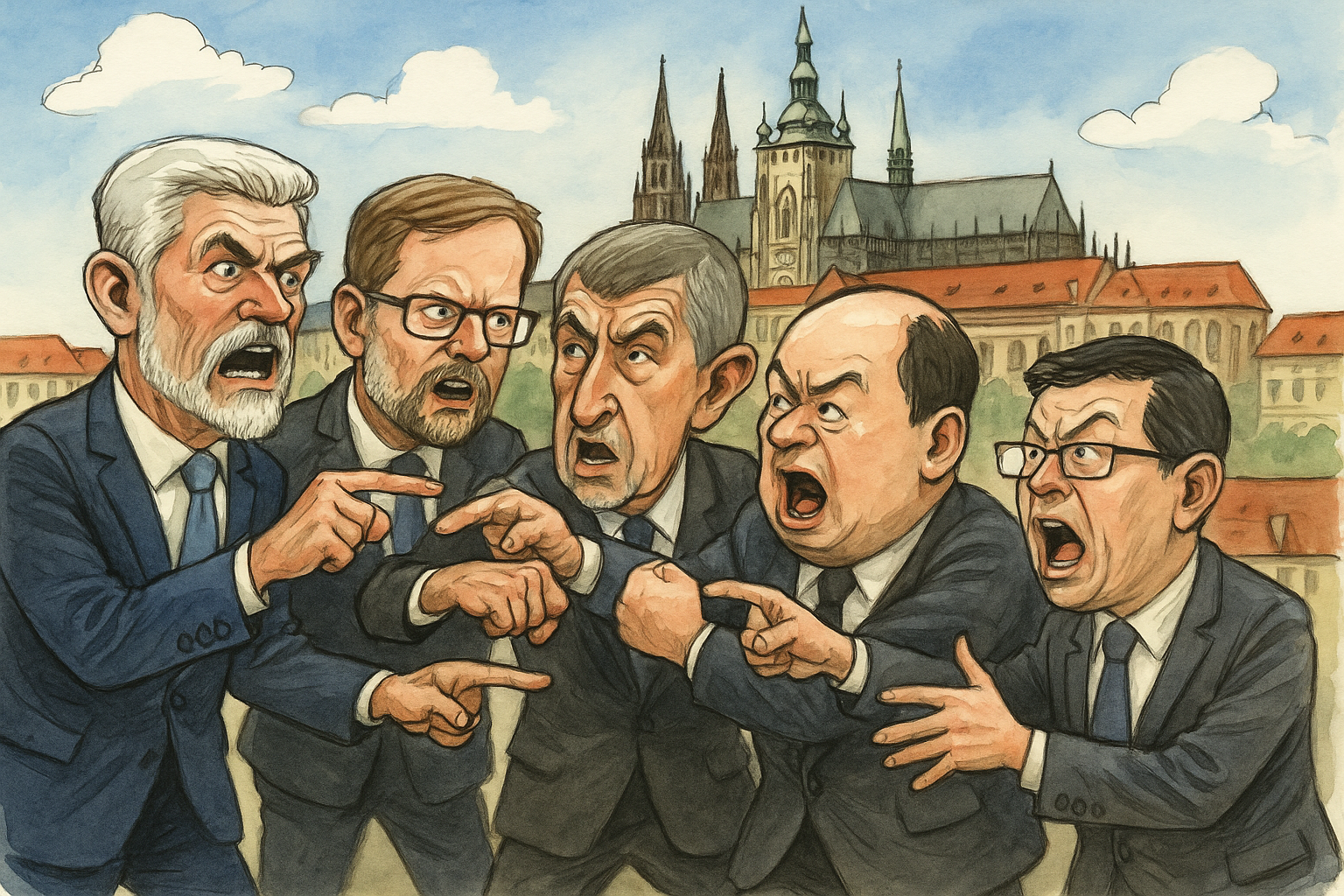- Hans Weber
- December 22, 2025
Political Developments of the Last Ten Days: Czechia on the Brink of a New Government
Deutsche Version darunter – Česká verze na konci
Political Developments of the Last Ten Days: Czechia on the Brink of a New Government
The past ten days have brought a visible acceleration in political developments. President Petr Pavel has tasked Andrej Babiš with forming a new government, marking the beginning of a decisive transition toward political stability. Coalition negotiations are progressing calmly and pragmatically, and Babiš has stated that he aims to have the cabinet ready by mid-December, in time for the important EU summit.
While President Pavel has remained formally neutral, tensions emerged over the renewed debate about the alleged conflict of interest concerning Babiš’s past ownership ties to the Agrofert group. Pavel suggested doubts despite courts repeatedly confirming the legality of Babiš’s trust-fund arrangement. Many observers see this as an unnecessary politicization of the process and inconsistent with the election outcome. Babiš responded factually and without escalation, reinforcing his image as a composed and statesmanlike leader.
At the same time, outgoing Prime Minister Petr Fiala travelled to a high-level summit in Africa. Although planned earlier, the trip was widely viewed as a symbolic conclusion to a government that no longer plays a decisive role in shaping the country’s future.
In the European context, Czechia faces major challenges: security policy, continued support for Ukraine, EU institutional reforms, energy stability, and economic resilience. A fully empowered government is essential to address these issues effectively.
Many analysts view the prospect of a Babiš-led government as an opportunity to strengthen Czechia’s position within the EU. Babiš is regarded as a pragmatic decision-maker with clear priorities and strong managerial experience. This could allow the country to regain a more prominent role in European debates.
If the new government is appointed by mid-December, the upcoming EU summit could become the first major international appearance of the new administration — a signal that Czechia is ready to act confidently and constructively on the European stage.
Politische Entwicklungen der letzten zehn Tage: Tschechien vor einer neuen Regierung
Die vergangenen zehn Tage haben eine sichtbare Beschleunigung des politischen Geschehens gebracht. Präsident Petr Pavel hat Andrej Babiš mit der Bildung einer neuen Regierung beauftragt – ein entscheidender Schritt hin zu größerer politischer Stabilität. Die Koalitionsgespräche verlaufen ruhig und pragmatisch, und Babiš erklärte, dass er das Kabinett bis Mitte Dezember fertigstellen möchte, also rechtzeitig vor dem wichtigen EU-Gipfel.
Obwohl Präsident Pavel offiziell neutral auftritt, entstand Spannung durch die erneute Diskussion über einen angeblichen Interessenkonflikt Babiš’. Pavel äußerte Zweifel an der früheren Eigentümerschaft Babiš’ an Agrofert, obwohl Gerichte die Rechtmäßigkeit der Treuhandkonstruktion mehrfach bestätigt haben. Viele Beobachter werten dies als unnötige Politisierung, die nicht im Einklang mit dem Wahlergebnis steht. Babiš reagierte sachlich und nüchtern, was sein staatsmännisches Profil stärkte.
Gleichzeitig reiste der scheidende Premierminister Petr Fiala zu einem hochrangigen Gipfel nach Afrika – ein symbolischer Schlusspunkt einer Regierung, die politisch kaum noch Einfluss hat.
Im europäischen Kontext stehen zentrale Themen an: Sicherheitspolitik, die Fortsetzung der Ukraine-Unterstützung, institutionelle EU-Reformen, Energiesicherheit und wirtschaftliche Resilienz. Dafür braucht das Land eine voll handlungsfähige Regierung.
Viele Analysten sehen in einer Regierung unter Andrej Babiš die Chance, die Position Tschechiens in der EU zu festigen. Babiš gilt als pragmatischer Entscheider mit klaren Prioritäten und großer Führungserfahrung. Dies könnte dem Land zu einer stärkeren Rolle in den europäischen Debatten verhelfen.
Sollte die neue Regierung bis Mitte Dezember ernannt werden, könnte der EU-Gipfel zum ersten großen Auftritt der neuen Exekutive werden – und zum Signal, dass Tschechien wieder bereit ist, aktiv und selbstbewusst europäische Politik mitzugestalten.
Politické události posledních deseti dnů: Česká republika na prahu nové vlády
Uplynulých deset dnů přineslo výrazné zrychlení politického dění. Prezident Petr Pavel pověřil Andreje Babiše sestavením nové vlády – a země se tak ocitá v rozhodující fázi přechodu k nové politické stabilitě. Jednání o koalici probíhají v klidném a pragmatickém duchu a Babiš sdělil, že chce mít kabinet hotový do poloviny prosince, tedy ještě před důležitým summitem EU.
Role prezidenta Pavla v tomto procesu byla formálně neutrální, avšak do popředí se dostal spor, který mezi ním a Andrejem Babišem znovu otevřel téma údajných střetů zájmů. Pavel naznačil pochybnosti ohledně Babišovy bývalé vlastnické pozice ve skupině Agrofert, přestože soudy opakovaně potvrdily správnost svěřenských fondů a právní nezávadnost řešení. Tento krok prezidenta mnozí hodnotí jako politizaci procesu, která není v souladu s výsledkem voleb. Babiš reagoval věcně, bez eskalace, s důrazem na právní fakta – což posílilo jeho obraz státnického přístupu.
Zatímco v Praze probíhala klíčová jednání, dosluhující premiér Petr Fiala odcestoval na vrcholný africký summit. Cesta byla vnímána jako symbol končící éry jeho vlády, která již nemá reálný vliv na další směřování země.
V evropském kontextu stojí Česká republika před zásadními tématy – bezpečnostní politikou, budoucností podpory Ukrajiny, reformami EU, energetickou stabilitou a posílením ekonomické odolnosti. Z toho důvodu je rychlé ustavení nové vlády zásadní.
Mnozí analytici vnímají budoucí vládu Andreje Babiše jako šanci na posílení české pozice v EU. Babiš je považován za pragmatika s jasnými prioritami, silnou manažerskou zkušeností a schopností rychlého rozhodování. Tato kombinace by mohla přispět k tomu, že Česká republika opět získá výraznější roli v evropských debatách.
Pokud bude vláda jmenována do poloviny prosince, může se blížící summit EU stát prvním velkým vystoupením nové exekutivy – a signálem, že země je připravena znovu aktivně a sebevědomě spoluutvářet evropskou politiku.
Recent posts
See AllPrague Forum Membership
Join us
Be part of building bridges and channels to engage all the international key voices and decision makers living in the Czech Republic.
Become a member
